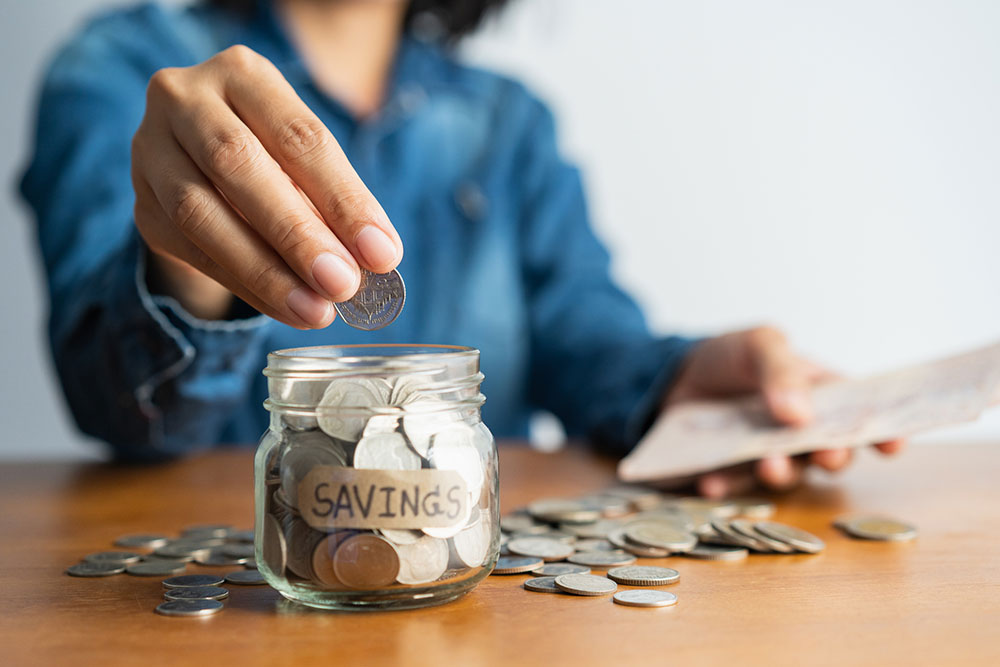What's stopping you from saving?
Find out why it's so hard to pay off debt or put money away for a rainy day.

We all know how to lose weight: eat less and exercise more. It’s simple, yet the dieting industry grows each year with new cookbooks, tv shows and exercise programs.
We also all know how to grow our wealth: don’t spend more than you earn. But, many of us still struggle to put money away for a rainy day or pay off our debt.
So, why is this?
It all has to do with our emotional connection to instant gratification. We want to feel healthy and fit, and we want to have oodles of money to rely on, but it can feel a lot better in the moment to skip the gym or go on a shopping spree.
This rinse and repeat cycle instil an understanding in our brain that if we want something now, we must have it to feel ‘better’. If this is you, it’s time to break the habit and become a life-long saver.
Pay yourself first
You can save and still get the ‘hit’ of instant gratification, by paying yourself first.
Set aside a percentage of your income in a separate savings account to help you build control and opportunities for spending over time. This could be as little as five percent, if that’s what your budget allows you, but will help you feel that sense of success of seeing your savings build.
Work out what’s left
Calculate the cost of all your bills and divide it by your pay periods to save for every bill. Don’t forget to include your car registration or any other annual payments which can often come as a nasty surprise.
Once you have your figure, sit down and decide whether this cost works in your best interest. Does it cost more for you to live than it should? Are you spending too much money on your phone bill or that gym membership you're really not using?
There’s lots of ways you can save on your bills, check out our handy how-to guide to save on your bills here.
Keep track of all the incidental spends
Now you’ve conquered the big bills, go through your statement and count up just how many times you’ve tapped your card for a coffee, brunch with friends, afternoon snack or that ‘must have’ sale item.
Our smaller purchases give us that big hit of instant gratification, but often come at the cost of your financial future.
A good way to crack the tap and pay habit is to use cash. Physically holding cash makes you form an emotional connection with it, and you’ll be less inclined to break that $50 note for a coffee you can make at home.
Set goals
If you don’t know what you’re working towards how do you know if you have ever reached it?
While it can be easy to set a goal, it’s also easy to fail at achieving it if it’s not realistic and justified. Write down your goals on a piece of paper and write why you want to achieve it.
Do you want to have enough money to pay for a new car so you’re less worried about whether your car will get you to work or not? Do you want to have a ‘rainy day’ fund so you can take a breath next time you lose a few hours at work?
Start small and make a plan to reward yourself when you achieve each goal.
Be kind to yourself
This is probably the most important step. I heard a great saying that you can’t make a mistake when you’re learning because you are learning and this is so true. You may have gone your whole life not being a great saver, so don’t expect to become a saver overnight.
If you make a mistake, draw a line in the sand and start again and before you know it, these times will become less and less.
Keep in mind, just like your physical health, it’s important to review, reassess and readjust as you go on with your financial health.
The information in this article has been prepared for general information purposes only and not as specific advice to any particular person. Any advice contained in the document is general advice and does not take into account any person's particular investment objectives, financial situation or needs. Before acting on anything based on this advice you should consider its appropriateness to you, having regard to your objectives, financial situations and needs.
Related topics
Things to note
The information in this article has been prepared for general information purposes only and is not intended as legal advice or specific advice to any particular person. Any advice contained in the document is general advice, not intended as legal advice or professional advice and does not take into account any person’s particular circumstances. Before acting on anything based on this advice you should consider its appropriateness to you, having regard to your objectives and needs.
Insurance Products (excluding Travel Insurance) are issued by RACQ Insurance Limited ABN 50 009 704 152 (RACQI) and arranged by RACQ Distribution Services Pty Ltd (RDS) ABN 35 116 361 650, AFSL 567130 and RDS' authorised representatives (including RACQ Operations Pty Ltd ABN 80 009 663 414, AR No. 234978 (RACQO)). Conditions, limits and exclusions apply.
Any advice provided by RDS and RACQO is general advice only and does not take into account your personal objectives, financial situation or needs and you will need to consider whether the advice is appropriate for you. Read the Product Disclosure Statement (PDS) before making a purchase decision on the product. You can also access our Target Market Determinations on this website.
RDS receives a commission from RACQI for the policies it arranges. RACQO receives fees paid for services it provides to RDS. Further details about remuneration are available on request prior to purchasing.
Banking and loan products issued by Members Banking Group Limited ABN 83 087 651 054 AFSL/Australian credit licence 241195 trading as RACQ Bank. Terms, conditions, fees, charges and lending policies apply. This is general advice only and may not be right for you. This information does not take your personal objectives, circumstances or needs into account. Read the disclosure documents for your selected product or service, including the Financial Services Guide and the Terms and Conditions, and consider if appropriate for you before deciding.
Except for RACQ Bank, any RACQ entity referred to on this page is not an authorised deposit-taking institution for the purposes of the Banking Act 1959 (Cth). That entity’s obligations do not represent deposits or other liabilities of RACQ Bank. RACQ Bank does not guarantee or otherwise provide assurance in respect of the obligations of that entity, unless noted otherwise.
RACQ Bank subscribes to the Customer Owned Banking Code of Practice which establishes higher standards than the law requires. The Code reflects modern consumer expectations and developments in approaches to issues such as consumer vulnerability, guarantors, and supporting customers through financial hardship. Please read our Customer Owned Banking Code of Practice page for more information.
RACQ Operations Pty Ltd (ABN 80 009 663 414 AR 000234978) and Members Travel Group Pty Ltd (ABN 45 144 538 803 AR 000432492) are acting as an Authorised Representative of the issuer of the insurance, Tokio Marine & Nichido Fire Insurance Co., Ltd. (ABN 80 000 438 291 AFSL 246 548). Any advice set out above is general in nature only, and does not take into account your objectives, financial situation or needs. Before purchasing any travel products, please consider the RACQ Travel Insurance Product Disclosure Statement (PDS) and the Target Market Determinations (TMDs) that apply to these products. Whilst the PDS outlines the Terms and Conditions of these products, the TMDs outline the intended class of customers that comprise the target market for these travel products. This will allow you to consider which products best suit your objectives, financial situation and needs and consider the products appropriateness to your personal circumstances. TMDs also outline matters involving the distribution and the review of these products. The PDS, Supplementary PDS and TMDs for each travel product can be found here.

